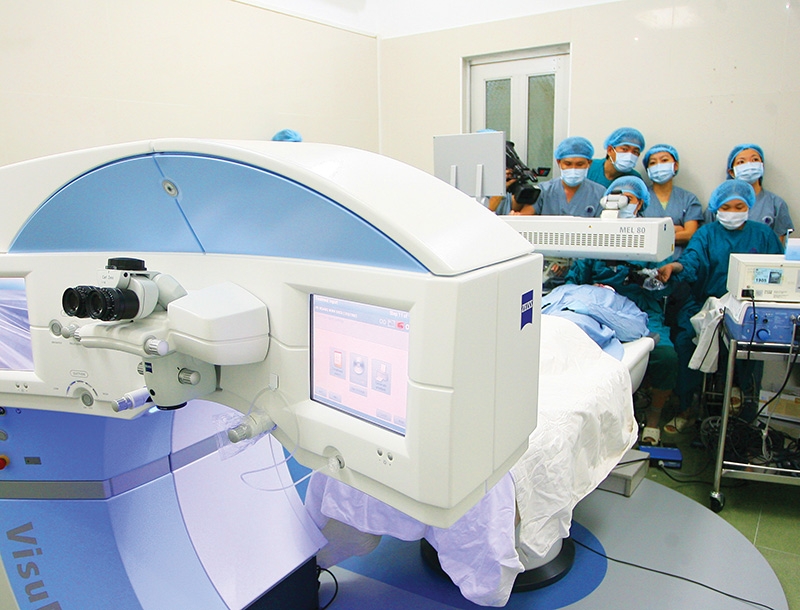Oncology medication disrupted by gridlock
 |
| Vietnamese hospitals are often forced to prioritise COVID-19 prevention over oncology work. Photo: Le Toan |
Hang Pham, a 40-year-old white-collar worker living in Hanoi, is feeling powerless as she does not know how to protect her father from growing lung cancer, with the latest COVID-19 outbreak possibly delaying his treatment for months.
“I have been living in constant fear since the Lunar New Year holiday. My father has not been able to receive chemotherapy since then. This can lead to metastasis, unless he gets treatment soon. However, all we can do now is to stay at home and wait,” she told VIR.
“Even worse, we are now in a 21-day quarantine at home after visiting the National Cancer Hospital (K Hospital) a few days ago where new infections were found. We are not certain when my father can visit the hospital again,” she said.
Following the outbreak in the northern province of Hai Duong in February, Hanoi, especially K Hospital and its facilities, as well as 20 other cities and provinces have been hit by the pandemic, delaying critical treatments for patients.
“I know many cancer patients who are in the final stages or should be getting chemotherapy and are quarantined instead,” Pham said. “I am waiting for treatment, including oncology drugs.”
Due to pandemic restrictions, the National Cancer Hospital and many others are now applying strict outbreak prevention and fight protocols – which sometimes includes the difficult choice to delay cancer treatment to ensure safety for all.
Vu Phuong Tran, country lead in Vietnam at the Integrated Oncology Centres told VIR, “During the social distancing period in April 2020, due to limited travel from province to province, we saw patients experiencing difficulty in reaching big centres like Hanoi and Ho Chi Minh City for treatment. The impact on cancer patient care needs to be observed further if the COVID-19 situation remains uncontained.”
Healthcare experts said that the pandemic not only affects patients but also hospitals as they face a fall in the number of patients and revenues, and cancer treatment is not the only health segment impacted. Bach Mai Hospital in Hanoi, one of the top-tier hospitals in the country, has admitted to having difficulties during the pandemic, along with the Hanoi Medical University Hospital and the Vietnam-German Hospital. which also reported a strong fall in the number of patients.
Pham Nhu Hiep, director of Hue Central Hospital told VIR, “Back before the pandemic we welcomed all cancer patients, but now we encourage light cases to get treatment at home and only receive serious cases for safety reasons.”
However, while treatment at hospitals is suspended unless necessary, patients still need to buy their medicine. Without hospital prescriptions, however, their purchases are not covered by health insurance, leading to skyrocketing private expenses.
At the hospital, Glivec is commonly used to treat certain blood cancers. Currently, health insurance will cover about 80 per cent of the drug cost, while the remaining 20 per cent is paid by patients. With health insurance, patients spend about VND2.7 million ($117) a month on average on their Glivec medication. Without health insurance, they would need to pay more than VND10 million ($435).
As the coronavirus outbreak continues, more challenges will await cancer patients – necessitating a more appropriate approach to ensure sufficient treatment for them.
What the stars mean:
★ Poor ★ ★ Promising ★★★ Good ★★★★ Very good ★★★★★ Exceptional
Themes: Healthcare Platform
- Opella and Long Chau join forces to enhance digestive and bone health
- Hanoi intensifies airport monitoring amid Nipah disease risks
- Cosmetics rules set for overhaul under draft decree
- Policy obstacles being addressed in drug licensing and renewal
- Sanofi, Long Chau Pharmacy relaunch medicine blister pack collection initiative
Related Contents
Latest News
More News
- Hanoi intensifies airport monitoring amid Nipah disease risks (January 29, 2026 | 15:21)
- 14th National Party Congress wraps up with success (January 25, 2026 | 09:49)
- Congratulations from VFF Central Committee's int’l partners to 14th National Party Congress (January 25, 2026 | 09:46)
- List of newly-elected members of 14th Political Bureau announced (January 23, 2026 | 16:27)
- 14th Party Central Committee unanimously elects To Lam as General Secretary (January 23, 2026 | 16:22)
- List of members of 14th Party Central Committee announced (January 23, 2026 | 09:12)
- Highlights of fourth working day of 14th National Party Congress (January 23, 2026 | 09:06)
- Press provides timely, accurate coverage of 14th National Party Congress (January 22, 2026 | 09:49)
- Press release on second working day of 14th National Party Congress (January 22, 2026 | 09:19)
- Minister sets out key directions to promote intrinsic strength of Vietnamese culture (January 22, 2026 | 09:16)

 Tag:
Tag:



















 Mobile Version
Mobile Version